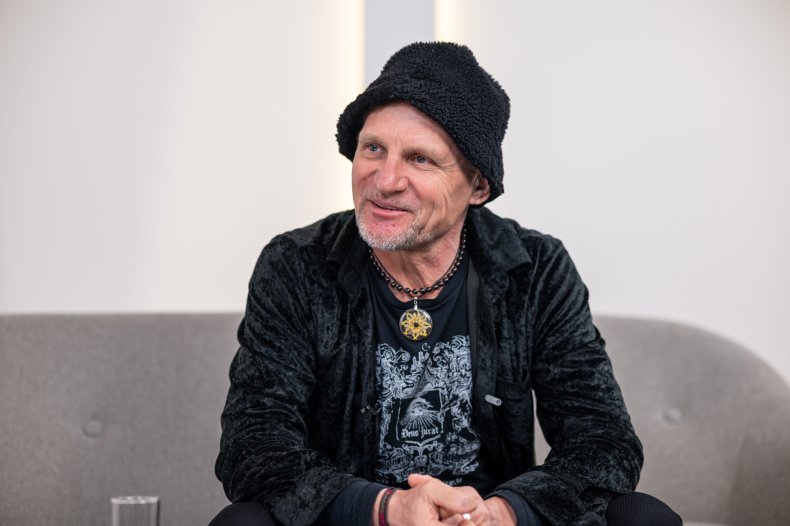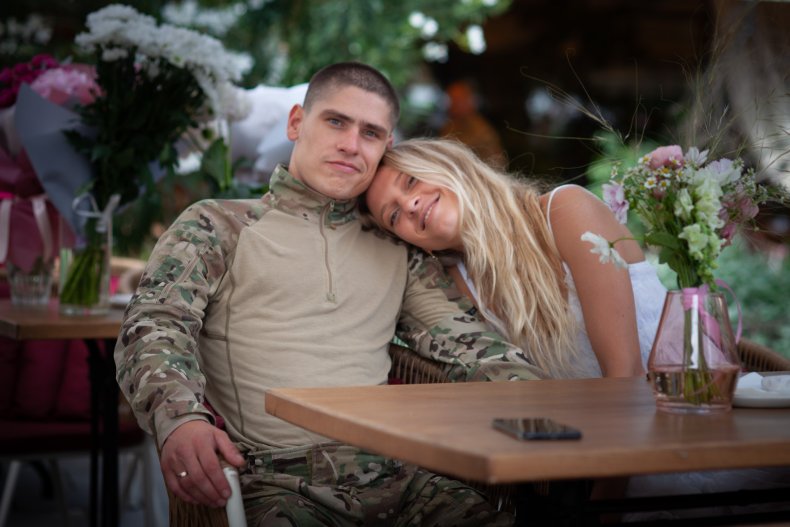As Russia’s unprovoked war against Ukraine reached the end of its 18th month, Ukrainian musician Oleh Skrypka was aiding his country’s fight from half-way around the world.
Throughout the month of August, Skrypka toured the United States, putting on a series of benefit concerts and hosting auctions aimed at raising money for the Ohmatdyt Children’s Cancer Hospital in Kyiv, which was struck by Russian artillery fire last year on the third day of the full-scale war.
One performance in particular, which took place on August 31 at the Rhapsody Theater in Chicago, demonstrated that, despite Russia’s ongoing attacks against Ukrainian civilians, many Russian citizens living abroad are also eager to aid Ukraine’s war effort.
Ukrainian martial law has placed severe restrictions on the freedom of able-bodied males between the ages of 18 and 60 to leave the country. However, exceptions have been made for cultural and political figures traveling abroad temporarily on official business, and fathers of three or more children are also free to cross the border. Skrypka, as a father of four, was thus able to come to America without significant bureaucratic effort.
His band, on the other hand, was not. In order to put on the show in Chicago, along with a prior gig in Madison, Wisconsin, a local group needed to be found, and Russian national Ilya Sokolov, manager of the self-styled “folk punk band” Fugu Dugu, took the opening as an opportunity to do what he could to help Ukraine defend itself from the land of his birth.
“For the past eight years, ever since the annexation of Crimea, I’ve been supporting Ukraine,” Sokolov told Newsweek, “and that support only became more important over the past two years.”
The members of Fugu Dugu shared their Russian manager’s enthusiasm.
“I asked them, ‘Can you learn 14 songs in a week?'” Sokolov said. “And they were so energized about meeting Oleg, and about the cause, that they did it.”
Andrew Naymick/Courtesy
Like Sokolov, who left Russia soon after the April 2014 annexation of Crimea, the Kremlin’s actions in recent years compelled Skrypka himself to cut ties with his home country. Before 2014, Ukrainian cultural figures, including current president Volodymyr Zelensky, formerly a comic actor, earned much of their income in the Russian market.
“I did many concerts in Russia before 2014,” Skrypka, responding in Ukrainian to Newsweek’s Russian-language questions, explained after the Chicago concert. “After Crimea, we started performing much more in Europe, even in America.”
“We also did shows for the troops in the Donbas,” he added, speaking of the war in eastern Ukraine that began in April 2014 after Russian-controlled forces began seizing government buildings in the Donetsk and Luhansk regions.
As a child, Skrypka, 59, spent significant amounts of time in both Russia and Ukraine, a fairly common experience for citizens of the historically intertwined neighboring countries. Even back then, however, the differences between the two nations were apparent.
“Russians and Ukrainians have different mentalities, and I made my decision early on to be Ukrainian,” he said.
The chain of events set in motion by Russian President Vladimir Putin’s decision to launch his invasion of Ukraine have only exacerbated those differences.

Stanislav Ivanov/Global Images Ukraine via Getty Images
“The war has accelerated trends in Ukraine’s development to true independence and sovereignty,” Skrypka said. “In the past year and a half, Ukrainian people have become better. They are more cooperative, more hard-working, and more creative than they would have been without the full-scale invasion.”
“In Russia, the situation is the opposite,” he added.
Unlike their Russian counterparts, many of whom have been labeled “foreign agents” by the Kremlin as a result of their public anti-war stances, Kyiv’s cultural elite has spent much of the past year and a half raising money to support their country’s fight for survival. Some Russian musicians who chose to side with the Kremlin have been mobilized to perform at home, sometimes in stadium-sized pro-war rallies that reportedly include the participation of paid audience members, but many of Russia’s most popular performers have emigrated abroad in a sign of opposition to Putin’s war.
While this group of Russian exiles finds itself in the difficult position of facing boycotts and blacklisting in the West over the actions of a government that they personally oppose, it is notable that virtually all of Ukraine’s most popular pre-war entertainers have taken up the cause of their country’s defense.
The collective response of ordinary Russians and Ukrainians has followed a similar pattern. Unlike in Russia, where the burden of military service has fallen disproportionately on the country’s more economically disadvantaged elements, the early days of the full-scale war saw tens of thousands of Ukrainians from all walks of life volunteering to take up the fight.
Alexei Gordeev, 27, who arrived in Chicago in July for medical treatment and attended Skrypka’s concert there, was one of them.
“My father is a musician who helps Oleg organize international concerts,” Gordeev, whose uncle was killed in 2016 after volunteering to fight in the Donbas, told Newsweek. “But I had not seen Oleg since he had come to visit me in the hospital after I was freed as a prisoner of war.”
Gordeev’s body still contains the Russian bullet that wounded him prior to his capture earlier this year near Vuhledar in eastern Ukraine. He spent 46 days in captivity before being freed this past March when Ukrainian soldiers accompanied by International Legion fighters took back the position where he was being held.
Despite having plenty of other options, Gordeev plans to return to the fight after completing his recovery.
“I’m from a well-off family,” Gordeev said. “I could have done essentially anything other than joining the army, but those options aren’t for me.”

Courtesy of Kateryna Okishor
Among Ukrainians, Gordeev’s sentiments are not a rarity.
“In the Ukrainian army, there are many people who believe in justice, and we couldn’t stand by and watch what Russia was attempting to do for our country,” he explained, “even if, for thousands of us, it came to a bad end.”
Many Ukrainians who are not personally prepared to take up arms are also doing what they can in the service of their country. One of the attendees at the concert was Anatolii Panaiotov, an emigre entrepreneur whose U.S. company, Global Fleet LLC, has provided him with the means to help Ukraine from his current home in Chicago.
“I try to do what I can to be useful,” Panaitov, who spent $2,200 on Skrypka merchandise during the auction phase of the benefit concert, told Newsweek.
“I talk with a lot of officers, and they say it’s more effective for me to be abroad making money and donating it than it would be for me to be just another guy in a foxhole,” he explained. “Maybe that’s not true, but it at least makes me feel better about being here doing what I’m doing.”
In addition to the contributions of Ukrainians and Russians to the Kyiv children’s hospital charity event, one American also played a notable role. After the concert, Rhapsody Theater owner Ricardo Rosenkranz invited Skrypka, Gordeev, Sokolov, Panaiotov, and a handful of others to watch him perform a card trick that took a stack of cards consisting of one queen of hearts and several nines of spades. As if by magic, he proceeded to transform the cards into a collection consisting entirely of queens of hearts.
Rosenkranz elucidated the metaphor, explaining that one queen of hearts in a society made up largely of banal cards contained the power to transform the others into something better. He then looked at Skrypka, whose English was good enough to understand the compliment that was paid him: “You’re the queen of hearts.”
Before everyone went home, there was one more announcement.
“The venue was free to you tonight,” Rosenkranz said. “Take all the money you raised, and give it to the children’s hospital.”


